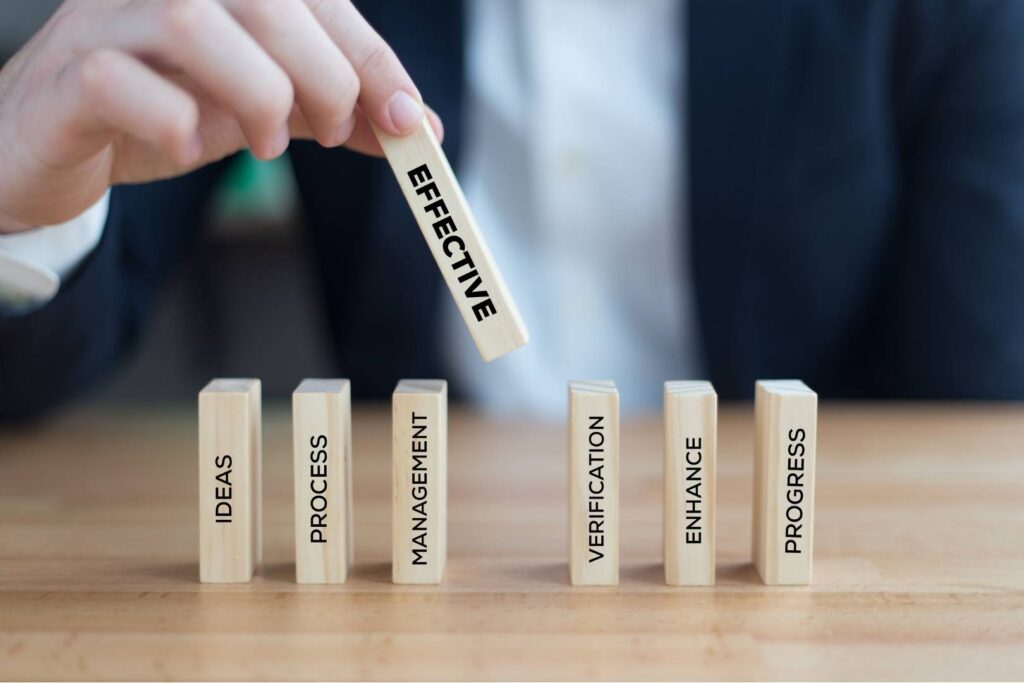Are you being productive or just active? This is one of our favourite parts of “The 4-Hour Work Week” by Timothy Ferriss. Why? It really makes you stop and evaluate if you are performing well. So, how does he define effectiveness and efficiency?
Effectiveness is doing the things that get you closer to your goals.
Efficiency is performing a given task (whether important or not) in the most economical manner possible. Being efficient without regard to effectiveness is the default mode of the universe.
I would consider the best door-to-door salesperson efficient- that is, refined and excellent at selling door-to-door without wasting time- but utterly ineffective. He or she would sell more using a better vehicle such as e-mail or direct mail.
This is also true for the person who checks e-mail 30 times per day and develops an elaborate system of folder rules and sophisticated techniques for ensuring that each of those 30 brain farts moves as quickly as possible. I was a specialist at such professional wheel-spinning. It is efficient on some perverse level, but far from effective.
Here are two truisms to keep in mind:
- Doing something unimportant well does not make it important.
- Requiring a lot of time does not make a task important.
From this moment forward, remember this: What you do is infinitely more important than how you do it. Efficiency is still important, but it is useless unless applied to the right things.
Efficiency vs Effectiveness in your surveying business
You will have processes in your business that you have become very efficient at. Sending out quotes, producing terms, generating invoices, and providing customers with job updates.
You know your processes and you’ve become pretty quick at filling everything in, updating systems or spreadsheets and tagging your emails.
But are you being effective? That depends on two factors:
- Is there a better way of managing your business and customers that is more efficient (saves more time) and doesn’t compromise on quality?
- What do you enjoy doing? If you’re happy spending time managing admin then this is fine. If you’d prefer more free time to work on your business, for carrying out surveys or to take a break then it’s time to stop and review.


Doing something unimportant well does not make it important.
You’ve become really good at filling in data from an email into a spreadsheet, into another document, into a report, into an invoice, into terms, into an email.
None of these tasks are important. They’re just necessary. At its core there are two important tasks you need to do well:
- Speaking with customers
- Surveys
Anything else is a distraction from what generates you revenue. Automating admin will be both more effective and more efficient. You’ll have more time to speak with customers and offer a personal service, and more time to focus on producing great surveys.
Attention spans are limited and you become less effective at the core tasks if you’re just focusing on being efficient at the processes you have.
Requiring a lot of time does not make a task important.
What should define if a task is important? Ultimately, how much it impacts your business and your customer. For your business this is carrying out surveys and converting enquiries. For your customers it’s easily instructing and receiving your report.
Other tasks just support this process but they aren’t the important parts. However, if your processes aren’t effective then they can take a lot of time to complete. Let’s say it takes 10 minutes to process and send terms and an invoice or slightly lower if you’ve become efficient at it. You could do it in 1-2 minutes with automation and produce the same outcome. That’s being more effective. That’s 8-9 minutes back for calls to customers or a tea break.
Another example is writing up a report. You could choose to outsource the writing up of the report so you can spend more time reviewing it and making sure the final output covers exactly what the customer wanted. Perhaps you want to keep control here. Instead of driving yourself to an appointment, you can pay someone to do the driving for you so instead of having idle time (sat in a drivers seat) between appointments you can start your analysis and write up. The time saved here means you could add in more appointments to your diary such an extra valuation which you’ll have written up by the time you’re dropped back home.
Stop and consider which of your tasks is a revenue generating task (important) or a supporting task to see if it’s as important as you think it is. If it is something you could handle more effectively with automation or outsourcing then change your process now.

Conclusion
Becoming quicker at a process doesn’t mean the process becomes an effective one. It just means you’re efficiently carrying out an ineffective method. Take time to review where you are losing time on tasks that aren’t important. Stop and look at processes that can help you do these more easily without being involved.
Then you can look at your more important processes and see where it’s important you keep your process the same and where you can automate things further.
Remember: being active does not mean you are being productive. It’s easy to keep getting distracted by tasks or have your time taken by ineffective processes leaving you feeling like you are busy. If it’s important, do it yourself. If it isn’t then automate or outsource so you can be more effective with your business.
